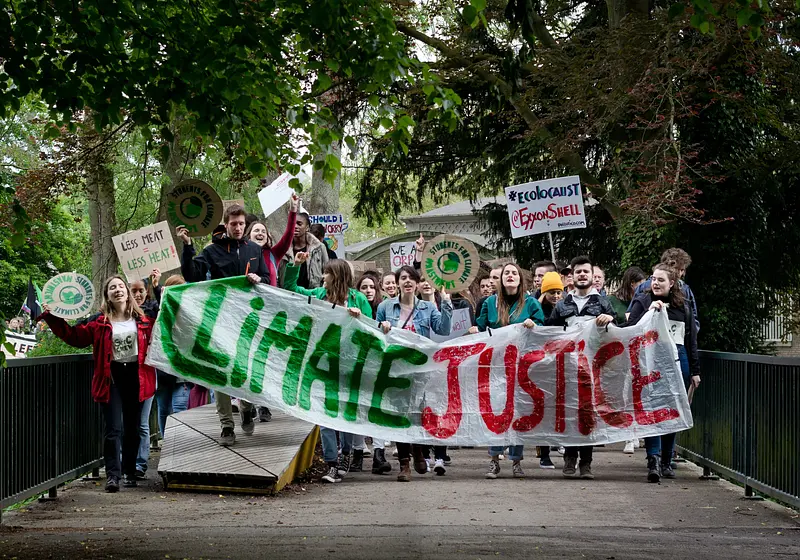Climate change is an issue that has threatened the various populations of Earth for centuries. Though this issue and its devastating effects are made apparent throughout the world, the older generations seem to brush it off. Thus, as we evolve, so does the maturity of teenagers from Generation Z. Every year, more teenagers have joined the fight and have started to advocate for climate change.
Amidst the pandemic, scientists have seen a change in the behavior of our climate. But, though the numerical value of the emissions and the average global temperature have decreased, not many talk about what's to come after the pandemic towards the environment. This calls for the support of teenagers across the globe to support the wave of consequences that would hit us after the pandemic has resolved. Read on to find out how you as a teenager can advocate for climate change, and inspire those around you.
Let us slide into your dms 🥰
Get notified of top trending articles like this one every week! (we won't spam you)The Pandemic
Climate change is all about our human activity, thus, before going into advocacy, it is vital to understand how our human actions have affected the climate amidst the pandemic. Taking the entire world by storm, the pandemic has caused economies to struggle to keep the countries together. As the number of COVID-19 cases increases, many borders have closed causing travel to become very limited. Most countries have even put themselves under lockdown, where citizens staying in their homes for most of their days have become the law.
Throughout this time, students have been asked to do online schooling while adults work from their homes. But working from home has a huge effect, not just on companies but entire industries. Some of these industries are very reliant upon certain countries to stabilize the economy or GDP.
Many of these industries are the major contributors to the emission of greenhouse gases into the atmosphere. Additionally, fewer people traveling around by motor vehicles has had an effect on the emissions. Simply put, during the lockdown, there was little to no need for the public to use their cars or public transport.

Take the Quiz: What Drama Should You Watch Next?
Take this quiz to find out what K-drama you should watch next!
The Bright Side
According to Wired, the level of emissions in China reduced by 25% after its major contributing industries were shut down. Compared to previous years in which the level of emissions have been increasing, this sudden decrease is astonishing on a certain level.
Though this is true, there are certain industries that need to stay open to help during the pandemic. This includes manufacturing companies that produce gloves, masks, and any other types of equipment that are heavily relied upon during the pandemic. This means that there are still emissions from these factories. However, compared to all the industries being opened at once, the need for only the necessary ones to be running has reduced the emissions as well.
When it comes to electricity, more of it is being used in homes than in commercial areas. Commercial areas are known to use more electricity as, of course, it is more likely to be a bigger area. At home, the electricity needed may be less than the amount needed in these commercial areas simply because it is smaller. Though this is a fact, the rate of the consumption of electricity in each country remains debatable.
This is due to the fact that electricity is mainly made through the mining of coal which goes into a factory. Factories convert the coal into electricity that we use, but at the same time, emit tons of toxic particles into the air which contributes to global warming.
According to Biological Diversity, planes are one of the biggest contributors to carbon dioxide. By 2050, it is foreseen that 5% of global emissions will be attributed to the aviation industry. Due to the pandemic causing borders to be closed, very few commercial planes have been flying. This has significantly reduced the emissions by 60% as per the BBC.
In Istanbul, the Bosphorus is known to be one of the busiest marine routes. Due to the shutdown of operations, waters in this area are less busy which has caused marine life to be able to swim freely there. This includes dolphins that were unable to swim in the waters due to the boats and ships frequently passing by the area. Moving to Albania, they have reported a population increase of about 3,000 flamingos for similar reasons.
The Dark Side
Some say that the pandemic has allowed nature to revert to what it once was. Though this might be true to a certain extent, what about the future? After the pandemic settles down, economies will do anything to get back on track to their operation capacity experienced before the virus hit. This means that the need for energy would increase drastically the same way it decreased.
The future holds a lot of possibilities that may come with its own share of consequences. Major economies like China, the US, India, and the UK may be the ones reversing all the progress we've made. These are the major production countries that other nations depend on.
The moment the pandemic passes, factories would be back. There will be an increased demand for goods, thus a rise in emissions once again. Once cities are deemed safe, there will be more use of public transportation as people will want to move away from the confinement of their own homes.
To control the aftereffect of the pandemic on the climate, one can only hope that policies and treaties are placed to control these emissions. The UN did it, and various countries signed their part; so would it be hard to take a little more commitment to ensure that the entire planet does not go to waste. Most would want to go back to how their economies were before but some may not realize that the pandemic has taught us to change and adapt to our norms.
Truthfully, no one can fully go back to the way their life was before the pandemic. It’s all precautions and safety now for the sake of our lives.
Teenagers Today
Teenagers today, are more involved in climate change because as some teen activists say, we may be the last generation to solve climate change before the effects are irreversible. Through education, teenagers can learn about the benefits of living a sustainable life not just for them but for the sake of the planet.
Sustainable living refers to the way of life in which we use renewable resources and reducing the average carbon footprint through transport, energy consumption, and diets. Currently, most people today, mainly the older generations are leading a life that's wasting Earth's resources and adding toxic particles into the air. Educating teenagers about climate change ensures that their lifestyles as they go through adulthood do not destroy the Earth just like the older generations are doing.
Especially in the modern era, teenagers can take advantage of technology to advocate for climate change so that future generations do not have to face the consequences of the actions of their ancestors. The lives of the future generations are in our hands thus, the reason for us to act now.
During the pandemic, media outlets have been addressing the change in the climate. Some say that animals have gone back to their natural habitats while others say that the average global temperatures have decreased. But these media outlets do not address the bigger picture of the effects of climate change after the pandemic.
Some teenagers around the world have found purpose in advocacy but have no way to help due to lockdowns and restrictions placed by their countries. Others' still do not understand the concept of climate change. Additionally, advocacy includes understanding a subject before fully getting into it. Thus, before getting into how you, as a teenager can help advocate for climate change, it is important to understand more about the difference between climate change and global warming.
How climate change is affecting teens
Truth be told, the current generation will not see the effects of climate change until we have kids. 20 years down the road, say the quality of the very air we breathe works against us, many kids will grow up with respiratory problems. This is to be attributed to the fact, that children have not completely developed their immune system compared to adults. Issues like asthma, cancer, and even a higher death rate will become a huge problem among future generations which could probably strip their childhood away from them.
Furthermore, climate change promoted forced migration and some of these migrants end up being refugees in countries that don't even want them. This, in turn, causes families to be separated and even death among them due to [censored] or other contributing factors.
Climate change also brings forth diseases into our lives. Waterborne diseases will spread to the food we're consuming and thus, complicate our health even for adults. Natural disasters contributed by human actions such as floodings and the haze will cause schools to shut down; depriving kids of education. Our job as parents are to protect our kids and the climate we live in will affect the way our kids survive.
Natural disasters also take away our basic needs leaving some families to find a way to survive in poverty. These families would have nowhere to go if the state of the planet continues to deteriorate and would ultimately face immediate dangers compared to the privileged.
For a long time, climate change has been seen as a political issue but in truth, it is a matter of basic human rights. Ask yourself whether you'd want to see your kids growing up in an environment in which their only purpose is to survive rather than to live. Personally, nobody would want to be stripped of their childhood and be put in a live-action hunger games situation and that is why we as teenagers should step up and fight climate change.
Teenagers today, see climate change as an issue that affects every species on this planet. But most if not all the older generation see it as a political move for their countries. We were supposed to look up to them but it is time we inspire the generations before us to do what is right and step up and fight climate change for the sake of future generations.
Teens for Climate Change
Years from now, it is the children and teenagers of today who are going to feel the consequences of climate change. 20 years ago, if you were to ask a teenager to advocate for climate change it'd mean nothing to them. The first question they would ask would probably be, “why should I care?” or “don't we have adults for that?”. But today, more teenagers are standing up for their homes that are being destroyed due to humankind's actions.
Youths like Greta Thunberg, Xiye Bastida, David Wicker, and others are fighting for the climate through advocacy. Advocacy helps us to understand that we're not fighting the prior generations just because we want to but rather because our lives and those of the future generations are on the line.
According to the United Nations, 84% of youth said that they needed more information to understand climate change. 73% of these youths said that they felt the effects of climate change and 89% of them said they intend to make a difference. If the generations prior to us are not going to take any action on the wave of consequences that are going to hit us, then it's time that we take matters into our own hands. In the age of technology, social media is our best tool. So how can you advocate for climate change as a teen?
1. Follow youth climate activists and other related accounts
As mentioned before, there are many activists from different parts of the world. These youths who all work towards the same cause are your easiest source of information, and their social media accounts often give out educational posts that can help you learn more about climate change. This allows you to understand more about the issue at hand from various outlets, just by a follow.
Activists
Informational
2. Visit trustable sources
Some sources may claim to contain information related to climate change and related topics. The concept of climate change is fragile and needs a lot of data and facts to be validated by specialists. Thus, websites such as the United Nations or any other well-established organizations that address the issue of climate change will be a more suitable source for facts and information.
- United Nations Framework Convention on Climate Change
- Intergovernmental Panel on Climate Change
- United Nations Environmental Program
3. Donate to the cause
Sometimes it's hard to help through social media and that is totally understandable. If you can, try donating to causes that try to fight climate change. However, be sure that these causes are legit.
Most of the time, these causes come from organizations that are real, but be sure to check that it's not a scam. Contact the person behind the donation drive and ask them questions to confirm their legitimacy before donating.
4. Share posts on social media
One of the biggest advantages of social media is the sharing of posts. Through the act of sharing you can educate your peers on the matter of climate change and help them to understand more about the very problem that threatens our planet. If more people share posts, then there would be more education which is what the age of technology is really about.
5. Start a club in school
Sometimes starting a club may seem scary to certain people. But through clubs, you can raise more awareness on the issue of climate change and pull more people to get involved to fight for the cause. Of course, during the pandemic, there's nothing much you can do in-person, but just having a Zoom call to talk and brainstorm about how you can help from your homes can be just as effective. Some websites mentioned above even have tool kits to help you start your own club which you can use if you are unsure about the process.
6. Inspire
If you see someone throwing trash on the floor, don't just walk away. Call them out and tell them to throw it into the bin but be sure to be polite and humble. There will be people who would downgrade you for caring about the very planet they live on because of their lack of judgment.
Look past all this and see the silver lining; your ability to stay on the right track to save our planet is good enough. If people see that you're not going to change your stance on the cause you're fighting, you might just inspire them to join you.













.jpg)